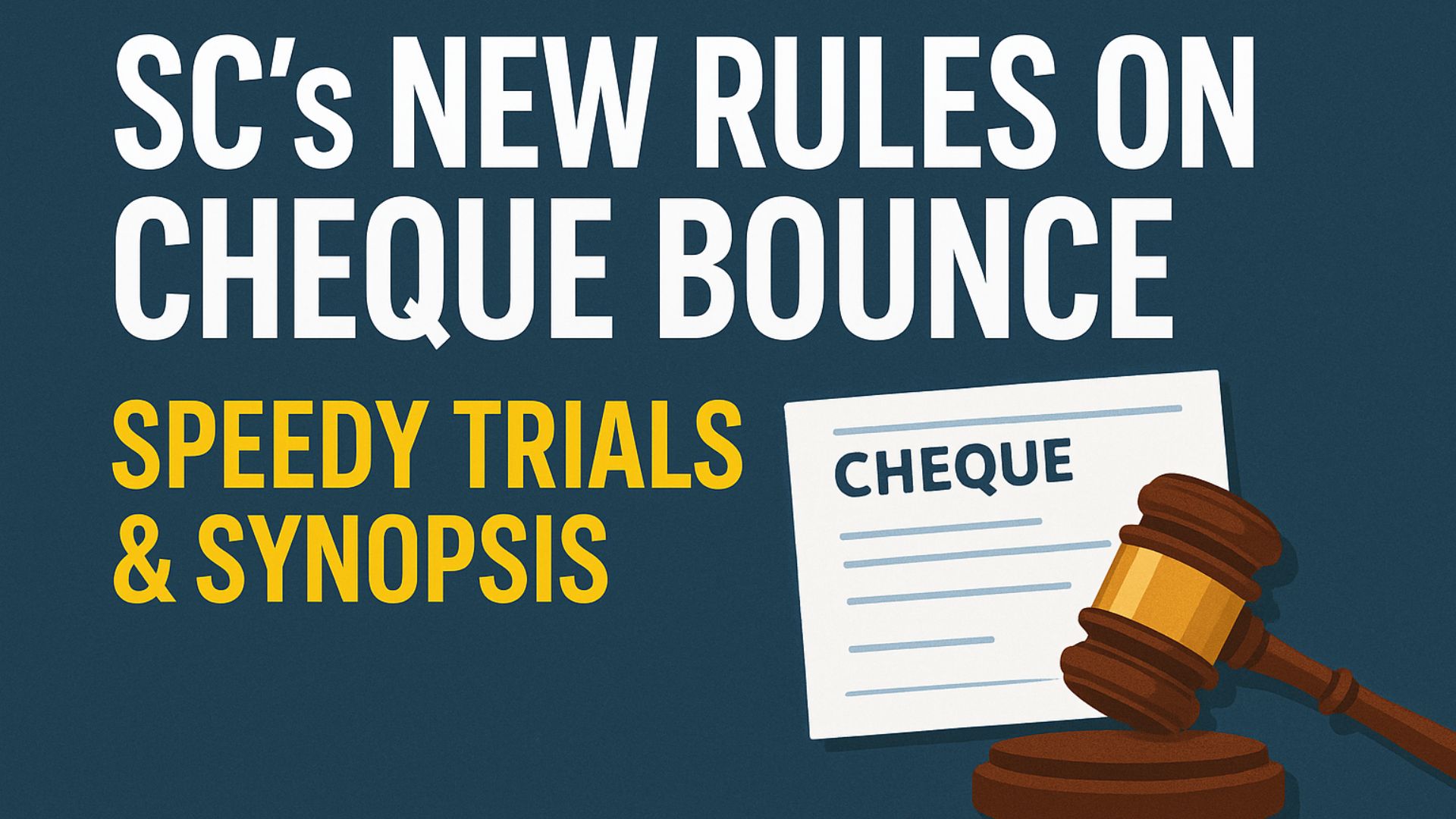
Supreme Court Issues New Guidelines for Cheque Bounce Cases: Mandatory Synopsis, Faster Trials, and Modified Compounding Rules
Court says presumptions under NI Act are binding; dishonoured cheques remain enforceable even if cash loan violates Income Tax Act
New rules aim to reduce huge backlog of cheque dishonour cases; online payments, dual summons, and structured questioning introduced
By Our Legal Correspondent
New Delhi: September 26, 2025: The Supreme Court of India has issued sweeping new guidelines to speed up the trial of cheque bounce cases under Section 138 of the Negotiable Instruments Act, 1881 (NI Act). The ruling came in the case of Sanjabij Tari v. Kishore S. Borcar & Another (2025 INSC 1158), where the Court overturned a Bombay High Court acquittal and restored the conviction of the accused.
The two-judge bench of Justice Manmohan and Justice N.V. Anjaria not only clarified the law on presumptions under the NI Act but also introduced mandatory procedural reforms to tackle the massive backlog of cheque dishonour cases across India.
Background of the Case
- The case began when Kishore S. Borcar issued a cheque of ₹6,00,000 to the complainant, Sanjabij Tari, in repayment of a friendly loan.
- The cheque was dishonoured, and the complainant filed a case under Section 138 NI Act.
- Both the Trial Court (2007) and the Sessions Court (2008) convicted the accused, holding that he failed to rebut the statutory presumption of liability.
- However, in 2009, the Bombay High Court at Goa acquitted the accused, questioning the complainant’s financial capacity.
- The complainant appealed to the Supreme Court, which has now restored the conviction and issued nationwide guidelines.
Supreme Court’s Key Legal Findings
The Court made several important clarifications:
- Presumptions are Binding: Once a cheque is signed and admitted, the law presumes it was issued for a valid debt. The burden shifts to the accused to prove otherwise.
- Financial Capacity Not Always Relevant: Even if a loan was given in cash above ₹20,000 (in violation of Section 269SS of the Income Tax Act), the debt is still enforceable. The violation only attracts tax penalties, not invalidation of the debt.
- Revisional Powers are Limited: High Courts cannot overturn concurrent findings of lower courts unless there is clear perversity or jurisdictional error.
- Accused’s Defence Rejected: The claim that the cheque was a blank instrument given to help secure a bank loan was termed “unbelievable and absurd.”
- Failure to Reply to Notice: The accused’s silence after receiving the statutory demand notice was treated as an adverse factor.
New Guidelines for Cheque Bounce Cases
Acknowledging the “staggeringly high pendency” of cheque dishonour cases, the Supreme Court issued binding directions for all courts:
- Dual Service of Summons: Summons must be served through regular modes, dasti (by complainant), and electronic means (email, WhatsApp, SMS).
- Online Payment Facilities: District Courts must create QR codes/UPI links so accused persons can pay cheque amounts directly at the initial stage.
- Mandatory Synopsis: Every complaint must include a standardized synopsis of key details (cheque number, date, amount, bank, etc.) at the top.
- No Pre-Cognizance Summons: Magistrates need not issue summons before taking cognizance, reducing delays.
- Structured Questioning: Trial Courts must ask the accused specific questions about the cheque, signature, and liability at the start to decide if a summary trial is possible.
- Physical Court Hearings: After summons, cases should be heard in physical courts to encourage settlement.
Modified Compounding Rules
The Court also revised the 2010 Damodar S. Prabhu guidelines on compounding cheque bounce cases. The new costs are lower, reflecting falling interest rates and the need to encourage settlements:
|
Stage of Payment |
Cost Imposed |
|---|---|
|
Before defence evidence |
No cost |
|
After defence evidence but before Trial Court judgment |
5% of cheque amount |
|
Before Sessions Court/High Court in appeal/revision |
7.5% of cheque amount |
|
Before Supreme Court |
10% of cheque amount |
This is a major reduction from the earlier costs (up to 20%), making it easier for parties to settle disputes.
Why This Judgment Matters
- For Courts: It provides a clear roadmap to reduce the backlog of cheque dishonour cases, which form a large chunk of criminal dockets.
- For Businesses: It strengthens the credibility of cheques as a mode of payment, ensuring that dishonour leads to swift consequences.
- For Citizens: It simplifies procedures, introduces online payment options, and ensures faster resolution.
- For Legal System: It harmonizes conflicting High Court rulings and clarifies that tax law violations do not erase debt enforceability.
Broader Implications
- Digital Push: By mandating QR codes and UPI links, the Court has aligned cheque dishonour proceedings with India’s digital payment ecosystem.
- Transparency: The mandatory synopsis format will make complaints clearer and reduce procedural confusion.
- Settlement-Oriented: Lower compounding costs will encourage early settlements, reducing litigation burden.
- Consistency: The ruling ensures uniformity across courts, preventing misuse of revisional powers.
Final Decision in the Case
The Supreme Court:
- Restored the conviction of Kishore S. Borcar.
- Directed him to pay ₹7,50,000 in 15 monthly instalments of ₹50,000 each.
- Ordered all High Courts and District Courts to implement the new guidelines by November 1, 2025.
Conclusion
The Supreme Court’s ruling in Sanjabij Tari v. Kishore S. Borcar is a landmark judgment that reshapes how cheque bounce cases will be handled in India. By combining legal clarity, digital reforms, and settlement incentives, the Court has taken a major step toward reducing delays and restoring faith in the cheque system.
This decision will not only impact millions of pending cases but also set the tone for faster, fairer, and more efficient justice delivery in financial disputes.